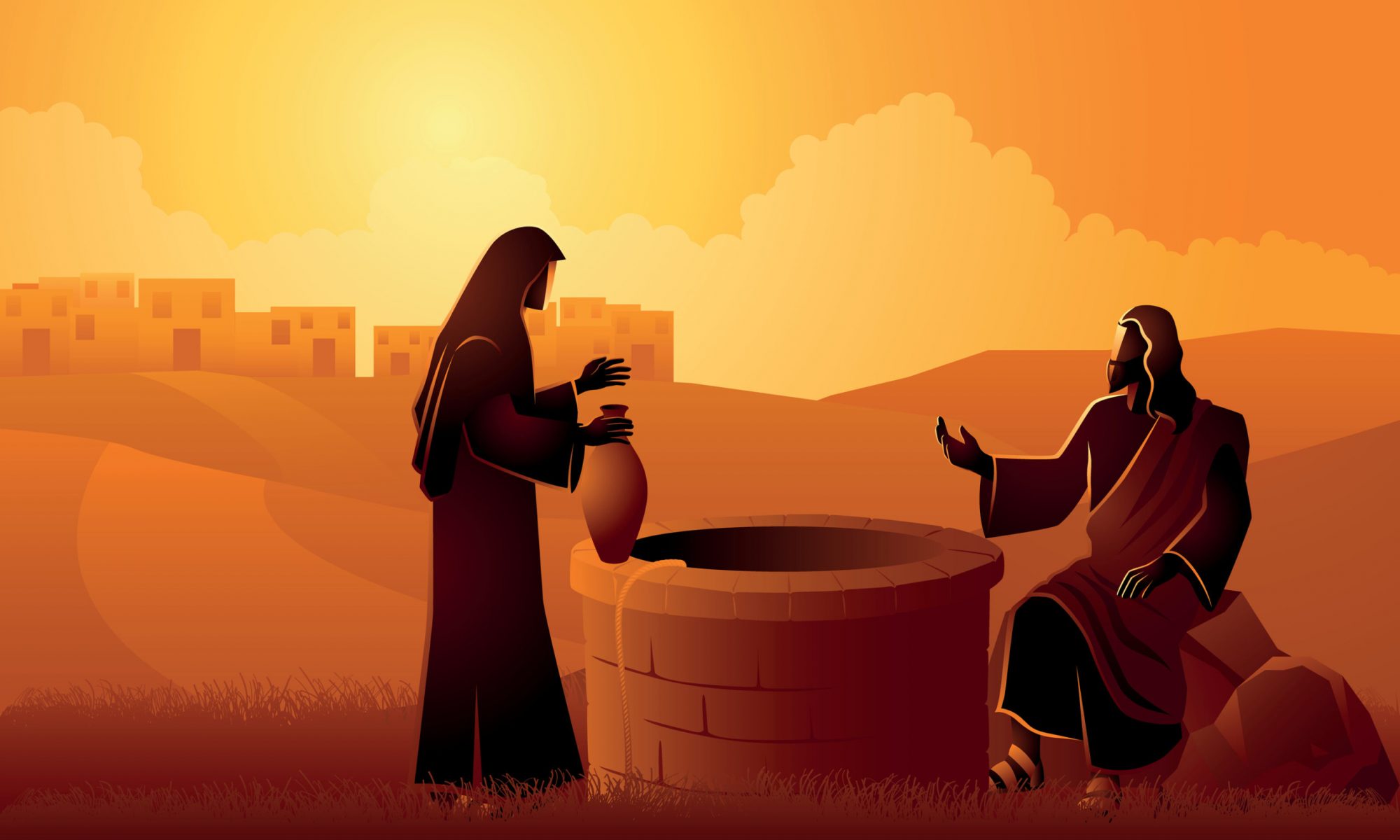Discussing Deep Theology at the Deep Well – Jesus Encounters the Woman at the Well
There are no less than five significant points of theological discussion that Jesus works through with the Samaritan woman at the well in their conversation.
That’s maybe a little different than you often think of this interaction. Let’s face it. If you know something about the Samaritan woman at the well, it is probably that she’s a whore. And the funny thing is, this one thing that everyone knows about her is almost certainly wrong (there are many possible explanations for her serial relationships besides that).
Rather than being suspicious of her sexuality, try this on for size: the Samaritan woman at the well is a thoughtful theologian. That’s what is actually there when we look at the text.
In fact, this is the longest theological conversation Jesus has with an individual recorded in any of the Gospels. And the discussion centers around debates between the Jews and Samaritans about worship.
Look with me at 5 touch points in these theological debates:
- Samaritan identity
- Samaritan ritual purity
- The importance of the Patriarchs
- The Messiah as the Knower of Secrets
- The proper place of worship
Read on, or watch this video to find out more about how Jesus and the woman navigate these 5 key areas of theological disagreement in their discussion.
Samaritan identity
Many Jews of Jesus’ day considered the Samaritans to be religiously inferior.
Their exact history and origins is shrouded in mystery. According to their own traditions, they were the true Jews. According to most Jewish voices, they were at best potential proselytes, and at worst pagans. When the woman asks about, “Our father, Jacob,” she is making a claim that both Jews and Samaritans stem from the faithful patriarchs Abraham, Isaac, and Jacob.
Jesus never challenges that. He yields the point that they really are connected to the patriarch Jacob, thus having some claim to being part of the covenant people.
Samaritan ritual purity
This identity question is deeply relevant to a major related concern: ritual purity.
Based on what we can gather from sources of the day, many Jewish teachers would have viewed Samaritans in general, and Samaritan women in particular, as unclean. For Jesus to have this conversation at all, and especially to ask for a drink of water from her, was out of bounds.
Uncleanness was passed on by contact, especially by drinking vessels. And Jesus was asking for a drink, of all things. By his mere presence and asking for a drink, Jesus is registering a theological point about the view many Jews had of Samaritans in his day.
The Samaritan woman is picking up on something important happening here.
The importance of the patriarchs
The patriarchs—Abraham, Isaac, and Jacob—played an elevated role in the religious practices of the Samaritans.
That’s because they didn’t use the same Bible as most Jews. They only accepted the first five books of what we call the Old Testament. Because of this elevated role that patriarchs play, her question about how Jesus stacks up against the patriarch Jacob is actually a theologically weighty one.
In essence, she is asking Jesus, “Who do you think you are, saying you are greater than the main vehicles through which God made himself known? What is your authority, you odd traveling Jewish rabbi who is asking me for a drink? where do you stack up against Jacob?”
She’s asking a theological question that is right on the money. After all, Jesus is claiming that he can give her better water than Jacob, the great patriarch. And water that gives life beyond any normal property.
That’s a big claim.
Messiah as the Knower of Secrets
The hinge point of the conversation comes when Jesus reveals knowledge about the woman’s life secrets.
This is really important because, as we just mentioned in the prior point, the Samaritans only accepted the first five books of the Bible. When they envisioned the coming Rescuer from God, they were not thinking of a Messiah in the line of David, like the Old Testament prophets point to. No. They were looking further back.
Back to Moses.
Deuteronomy 18:18 records God’s promise of sending another prophet like Moses. The Samaritans look to this person they called the Taheb. And the distinguishing feature of this Samaritan version of the Messiah was that he would be a knower of secrets who could reveal all things.
And, what do you know, Jesus shows up saying, “You’re right to say ‘I have no husband,’ because you’ve had five husbands and the one you’re with now is not your husband.”
Jesus is revealing secrets.
What’s up with the five husbands?
Jesus pointing out that she’s had five husbands is much more than an attempt to embarrass her with scandalous dirty laundry.
Indeed, since everything else in this discussion is deeply laden with symbolic meaning we’re encouraged to at least think through further why out of all the things he could have said, Jesus pointed to her marital life. Here, we are helped to think of the Jewish prophetic tradition of the Old Testament in which marriage and adultery is a key picture of religious fidelity. Pointing to her marriage history, Jesus at one and the same time shows himself as the Knower and Revealer of secret things and also as a great prophet challenging her on her faithfulness to the God she proclaims to worship.
That the woman responds with, “I see you are a prophet, so let’s talk about the right place to worship,” confirms that she is tracking with this discussion.
The proper place of worship
Any theological discussion between a Jew and a Samaritan has to discuss the proper place of worship.
The chief bone of contention between them is that the Samaritans claimed you should worship God on Mount Gerizim while the Jews claim you worship God on Mount Zion. Since Jesus has so far presented himself as greater than Jacob and one who can reveal secret knowledge, she asks him to weigh in on this thorny question. She is on a quest for knowledge at this point. One might say, she has left her quest for water far behind and is trying to find living water instead.
Jesus steps up to her question with the earth-shaking claim that he is God’s Messiah and is reshaping the landscape of worshipping God so that both Mt. Gerizim and Mt. Zion are taken up into something more complete, and more beautiful.
A bridegroom seeking a bride
The Woman at the well proves to be the perfect bride for Jesus.
No, to be clear, Jesus didn’t marry her (nor is there any reason to believe he married anyone else, either). But, metaphorically speaking, she is the perfect bride. The one ready to receive him as Messiah with worship. Worship in spirit and in truth.
This bride/bridegroom image is encouraged by the very shape of the account.
When we look at the whole Bible we see a repeated pattern of meeting by a well. Jacob’s servant meets Rachel by the well, Moses meets Zipporah there, etc. And this isn’t the first time in the Gospel of Johwn we’ve encountered the picture of Jesus as a bridegroom in search of a bride.
The wedding feat at Cana back in John 2 encourages us to see Jesus as a bridegroom come looking for a New Israel, a New People of God, that is, a new bride.
The woman at the well stands there toe-to-toe, asking all of the good questions, and coming to all the right conclusions as Jesus leads her on into a new understanding. This is exactly the new sort of bride that Jesus comes to rescue.
This woman and her conversation here is a picture for all time of how to receive Jesus.
And it’s a beautiful picture that unfolds in this deep and thoughtful theological discussion.
July 28, 2024 Church Service
July 14, 2024 Church Service
July 7, 2024 Church Service
VBS 2024 Registration
This year’s Vacation Bible School theme is The Great Jungle Journey. It will take place Monday, Aug. 12–Friday, Aug. 16, 9 a.m.–noon. We hope you’ll join us! To register for VBS, please click here.


